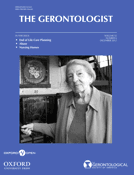
GERONTOLOGIST
Scope & Guideline
Innovating Care for Older Adults
Introduction
Aims and Scopes
- Mental Health and Emotional Well-being:
Research on mental health issues such as depression, anxiety, and emotional well-being among older adults, including interventions and therapies to improve psychological outcomes. - Social Support and Caregiving:
Exploration of the role of social networks, community support, and caregiving dynamics affecting older individuals, particularly in the context of dementia and chronic illnesses. - Cognitive Function and Aging:
Studies investigating cognitive decline, cognitive interventions, and the relationship between cognitive health and overall well-being in older populations. - Health Disparities and Access to Care:
Examination of barriers to healthcare access, disparities in health outcomes among diverse older adult populations, and strategies to enhance care delivery. - Physical Health and Chronic Conditions:
Research on physical health challenges, chronic illnesses, and the influence of lifestyle factors on health outcomes in older adults. - Innovative Interventions and Technologies:
Development and evaluation of new interventions, including digital health technologies and telehealth services, aimed at improving care for older adults.
Trending and Emerging
- Mental Health Interventions:
An increased focus on mental health interventions, including telehealth and digital therapies, demonstrates a growing recognition of the importance of mental health in aging. - Diversity and Inclusion in Aging Research:
Research addressing the experiences of diverse populations, including racial and sexual minorities, highlights the need for inclusive practices in gerontology. - Financial Exploitation and Decision-Making:
Emerging studies on financial literacy, exploitation, and decision-making processes in older adults reflect growing concerns about economic security and autonomy. - Technology and Aging:
The integration of technology in aging research, including the use of telehealth and digital tools for caregiving and health management, is becoming increasingly prominent. - Caregiver Support and Resilience:
Research on caregiver dynamics, resilience, and support mechanisms is gaining traction, emphasizing the importance of caregivers' well-being in the context of aging. - Social Participation and Community Engagement:
Growing interest in the impacts of social participation on mental and physical health outcomes for older adults underscores the importance of community involvement.
Declining or Waning
- Traditional Aging Models:
There has been a noticeable decrease in research centered on traditional models of aging that do not integrate modern understandings of psychosocial factors or health disparities. - Basic Biological Research:
The journal has shifted away from purely biological studies of aging, focusing more on psychosocial aspects and practical applications rather than basic biological mechanisms. - Isolation and Loneliness Research:
Although still relevant, the exploration of isolation and loneliness, while important, appears less prominent compared to emerging discussions on mental health interventions and community engagement. - Interventions Focused Solely on Physical Health:
Research concentrated solely on physical health interventions without considering the broader psychosocial context has diminished, as the focus has shifted towards integrated care approaches. - Elder Abuse Studies:
Interest in elder abuse topics has waned in favor of broader discussions on financial exploitation and mental health, reflecting a shift towards understanding the complexities of aging in society.
Similar Journals
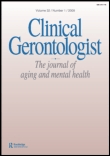
Clinical Gerontologist
Exploring the intersection of psychology and gerontology.The Clinical Gerontologist is a premier journal published by Routledge Journals, Taylor & Francis Ltd, that focuses on the interdisciplinary field of gerontology and clinical psychology. With its rich history dating back to 1982 and extending until 2024, this journal serves as a vital resource for researchers, practitioners, and students interested in the complex dynamics of aging and the psychological aspects of care for older adults. Boasting a commendable impact factor and ranking in the top quartiles across multiple categories—including Social Sciences, Geriatrics, and Clinical Psychology—the Clinical Gerontologist demonstrates its commitment to advancing knowledge and best practices within this critical area. Its rigorous peer-reviewed articles address emerging trends, evidence-based practices, and policy implications, making it essential reading for anyone involved in geriatric care and research. While not an open-access journal, it provides access to its diverse range of scholarly articles and research findings, ensuring that critical information reaches those dedicated to enhancing the well-being of the older population.
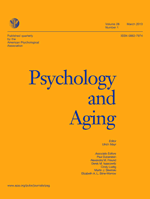
PSYCHOLOGY AND AGING
Connecting empirical research with aging-related practices.Psychology and Aging, published by the American Psychological Association, is a premier journal dedicated to advancing the field of psychology as it relates to aging. ISSN 0882-7974 and E-ISSN 1939-1498, this esteemed journal has been a key resource since its inception in 1986 and continues to shape the discourse surrounding aging-related psychological phenomena. The journal boasts impressive rankings in various academic categories, placing in Q2 for Aging, Q1 for Geriatrics and Gerontology, and Q1 for Social Psychology in 2023, highlighting its significance in multiple disciplines. With Scopus rankings that position it within the top tier of psychology and medical journals, Psychology and Aging serves as a vital forum for researchers, professionals, and students alike, facilitating the exchange of rigorous empirical research and novel theoretical insights. This journal is instrumental in elucidating the complexities of psychological function across the lifespan, ultimately contributing to improved interventions and policies affecting older adults.
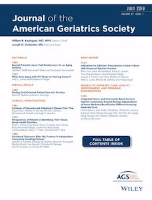
JOURNAL OF THE AMERICAN GERIATRICS SOCIETY
Shaping the Future of Aging Research and PolicyJOURNAL OF THE AMERICAN GERIATRICS SOCIETY, published by Wiley, stands as a leading resource in the field of geriatrics and gerontology. Established in 1953 and converging into a comprehensive academic platform through 2024, this esteemed journal is recognized for its high impact, holding a Q1 ranking in its category for 2023. It serves as a vital conduit for innovative research, clinical practices, and policy discussions aimed at improving the health and well-being of older adults. With a commitment to advancing geriatric medicine, the journal contributes significantly to the ongoing dialogue among researchers, healthcare professionals, and students dedicated to this rapidly evolving field. Although currently not offering open access options, the journal remains invaluable for those seeking to access pivotal studies and reviews that shape the future of geriatrics.

Aging Medicine
Connecting Researchers and Practitioners in AgingAging Medicine, published by Wiley, is a pivotal open-access journal that has been at the forefront of research dedicated to the aging population since its inception in 2018. With a focus on both geriatric care and gerontology, the journal serves as a crucial resource for researchers, healthcare professionals, and students interested in understanding the complexities of aging and the related medical challenges. Although it holds a Q3 quartile ranking in the fields of Aging and Geriatrics and Gerontology according to the 2023 metrics, the journal continues to effectively disseminate valuable research and insights, helping to bridge gaps in knowledge and practice. With an E-ISSN of 2475-0360, it offers an open-access model that ensures broader accessibility to its published content, thus promoting collaboration and innovation across disciplines. As the journal converges towards 2024, it remains committed to evolving with the dynamics of aging research, making it a significant platform for the exchange of ideas and advancements in this essential field.

Ageing International
Navigating the Complexities of Ageing in SocietyAgeing International, published by SPRINGER, is a distinguished journal that has been at the forefront of scholarly research in the field of gerontology and aging studies since its inception in 1974. With an ISSN of 0163-5158 and an E-ISSN of 1936-606X, this journal provides a platform for high-quality, peer-reviewed articles that address the multifaceted aspects of aging on both individual and societal levels. Recognized as a Q2 category journal in Health (social science) for 2023, Ageing International plays a critical role in disseminating knowledge that influences practice, policy, and future research directions in the ever-evolving landscape of aging. Researchers, professionals, and students will find this journal indispensable for staying current with cutting-edge analyses and discussions, as it holds a Scopus rank of #168 in the social sciences realm, placing it within the 54th percentile of its category. Although it does not offer an open-access model, its extensive archive and ongoing contributions to the literature make it essential reading for anyone engaged in understanding the challenges and opportunities of aging in society. The editorial office is located at ONE NEW YORK PLAZA, SUITE 4600, NEW YORK, NY 10004, UNITED STATES, further emphasizing its dedicated presence in the academic community.

Salmand-Iranian Journal of Ageing
Exploring the science of ageing with accessibility.Salmand-Iranian Journal of Ageing is a pioneering open-access publication dedicated to advancing the knowledge and understanding of ageing and geriatric health. Launched in 2006 by NEGAH INST SCIENTIFIC COMMUNICATION, this journal serves as a vital resource for researchers, professionals, and students within the fields of Geriatrics and Gerontology. Published in Iran, it aims to provide a platform for disseminating innovative research and clinical findings pertaining to ageing, with a commitment to accessibility and scholarly excellence. The journal holds recognition in its category with a Q4 designation in Aging and a Q3 classification in Geriatrics and Gerontology (2023), indicating its growing influence in academic circles. Despite a current H-index designation of '-', the journal's impact within its scope continues to develop. As it converges research efforts from 2018 to 2024, it seeks to address the pressing challenges faced by the ageing population. With no cost barriers for readers, the Salmand-Iranian Journal of Ageing remains an essential tool for fostering dialogue and collaboration in the quest for improved senior health outcomes.

EXPERIMENTAL AGING RESEARCH
Transforming Understanding of the Aging JourneyEXPERIMENTAL AGING RESEARCH, published by Taylor & Francis Inc., is a leading journal that has been at the forefront of aging research since its inception in 1975. With an ISSN of 0361-073X and an E-ISSN of 1096-4657, this journal has earned a notable reputation, including a Q3 ranking in the field of Aging and impressive Q1 and Q2 rankings in Arts and Humanities and Geriatrics and Gerontology respectively. This positions the journal within the top percentile of its category, highlighting its significant impact and contribution to the scientific community. Covering a broad scope that intersects various disciplines, EXPERIMENTAL AGING RESEARCH aims to disseminate pioneering research, foster interdisciplinary collaboration, and provide a platform for innovative studies that enhance understanding of the aging process. While it currently does not offer Open Access, researchers and academics can access its rich repository of knowledge that spans multiple facets of aging, from physiological changes to psychological impacts. As the field of aging continues to evolve, this journal remains an essential resource for researchers, professionals, and students dedicated to advancing knowledge and practices concerning aging and longevity.
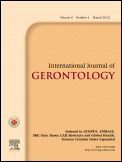
International Journal of Gerontology
Fostering collaboration in the field of gerontology.International Journal of Gerontology is a distinguished peer-reviewed journal dedicated to advancing the field of gerontology and addressing the multifaceted challenges associated with aging. Published by the Taiwan Society of Geriatric Emergency & Critical Care Medicine, this innovative journal has been an open-access platform since 2018, ensuring that vital research is accessible to a global audience. With an ISSN of 1873-9598, it serves as a crucial resource for researchers and practitioners focused on the biological, psychological, and social aspects of aging. The journal is indexed in Scopus with a rank of #103/116 in the Medicine category (Geriatrics and Gerontology) as of 2023, placing it in the Q4 quartile—a testament to its evolving impact in the field. Spanning works published from 2007 to 2024, the International Journal of Gerontology facilitates the dissemination of critical research findings and clinical practices that inform and enhance geriatric care and research methodologies.
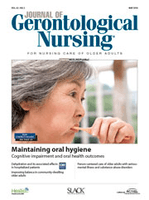
Journal of Gerontological Nursing
Empowering Gerontological ExcellenceThe Journal of Gerontological Nursing, published by SLACK INC, is a leading peer-reviewed journal dedicated to advancing the field of gerontological nursing through innovative research, clinical practice, and educational advancements. Since its inception in 1975, this journal has become a crucial resource for researchers, healthcare professionals, and students interested in the care and management of older adults. With an impact factor that reflects its significance within the disciplines of gerontology and nursing (Category Quartiles: Q3 in Gerontology and Q3 in Nursing), it serves as a platform for disseminating vital findings, best practices, and evidence-based approaches aimed at improving the quality of life for the aging population. While the journal maintains a print-only format, its content is invaluable for those looking to stay ahead in the rapidly evolving landscape of gerontological care. As it continues to publish until 2024, the Journal of Gerontological Nursing invites contributions that foster dialogue and innovation within this essential area of healthcare.
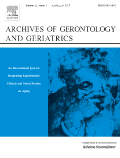
ARCHIVES OF GERONTOLOGY AND GERIATRICS
Shaping the future of geriatric practice through research.The Archives of Gerontology and Geriatrics, published by Elsevier Ireland Ltd, is a leading journal in the fields of Aging and Geriatrics and Gerontology. With an ISSN of 0167-4943 and an E-ISSN of 1872-6976, it has established itself as a crucial platform for disseminating high-quality research focused on the biological and psychosocial aspects of aging. The journal holds an impressive Q2 ranking in both Aging and Geriatrics and Gerontology, and a Q1 ranking in Gerontology and Health (Social Science) as of 2023, reflecting its significant impact in these disciplines. Additionally, the journal is ranked #33/371 in Social Sciences (Health) and #5/39 in Nursing (Gerontology) according to Scopus, showcasing its esteemed position in the academic community. Although currently not open access, the journal offers a wealth of research articles from 1982 to the upcoming 2025 that are vital for stakeholders including researchers, healthcare professionals, and students aiming to advance their understanding of aging processes and policies. Titles published within its pages contribute to shaping agendas in public health and gerontological practice, making it an essential resource for those involved in the study of the elderly population.